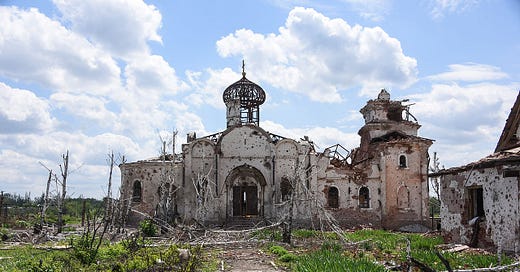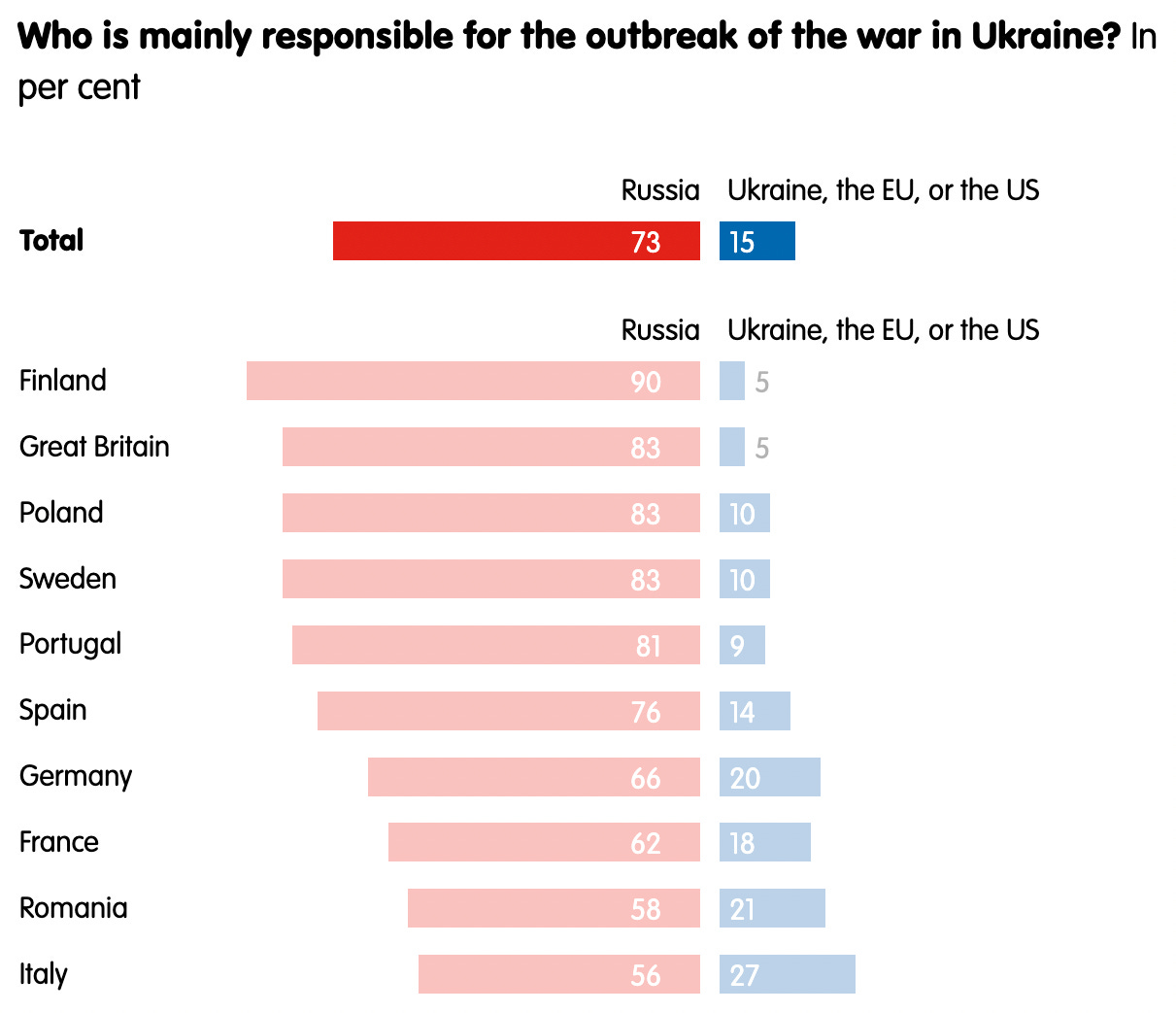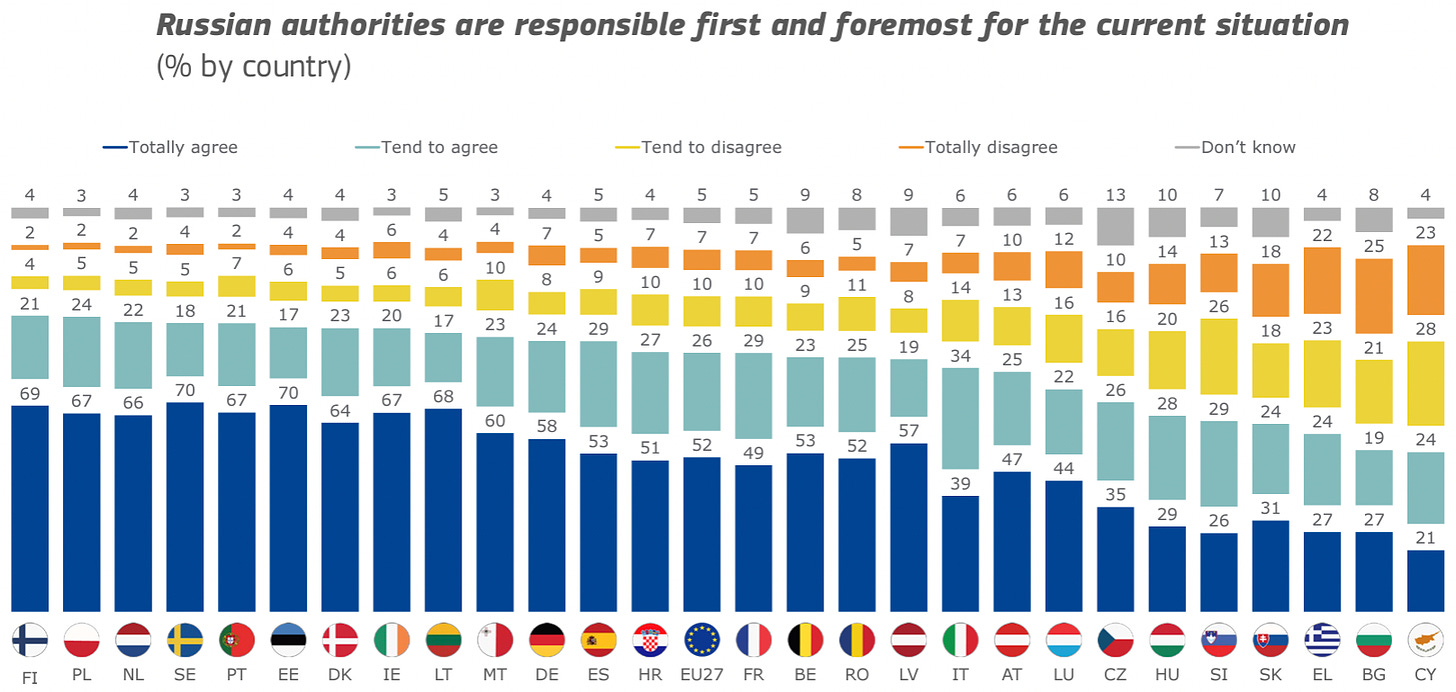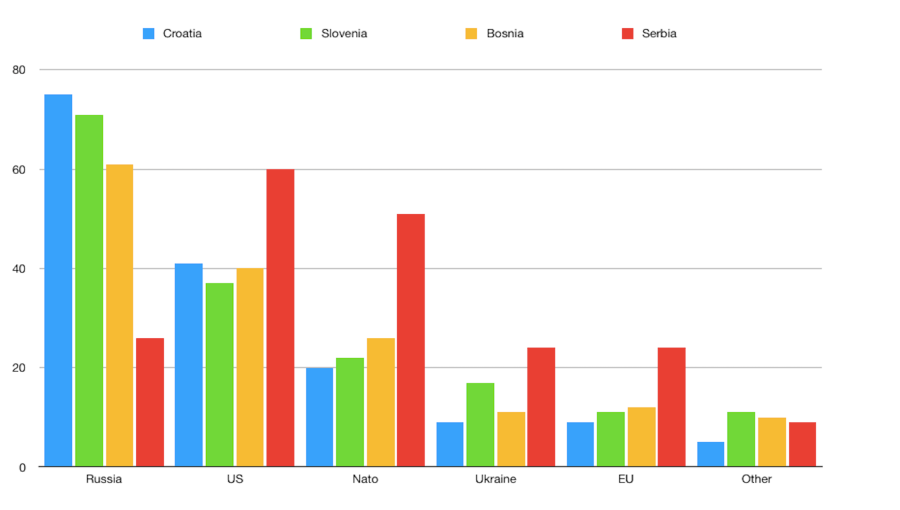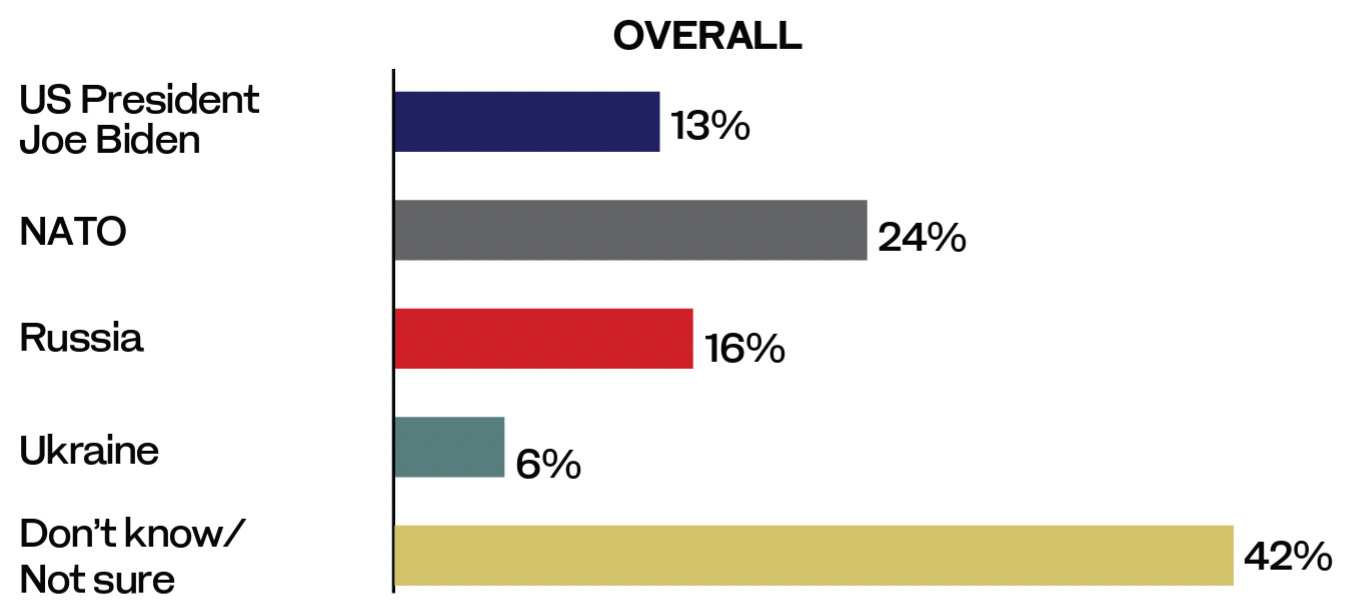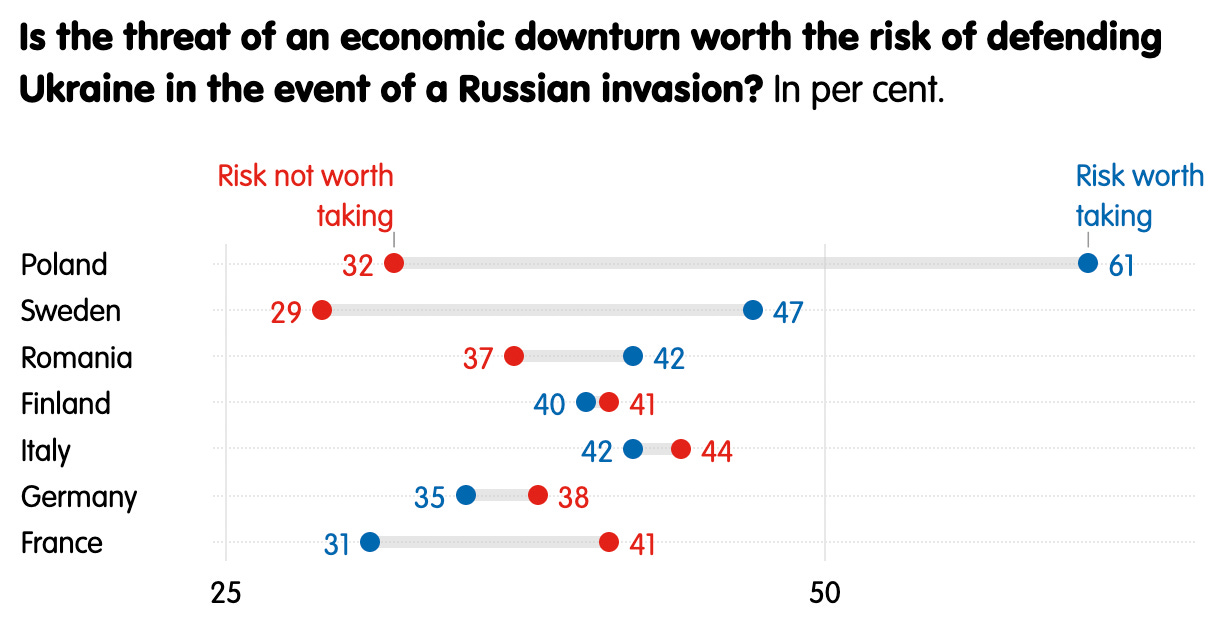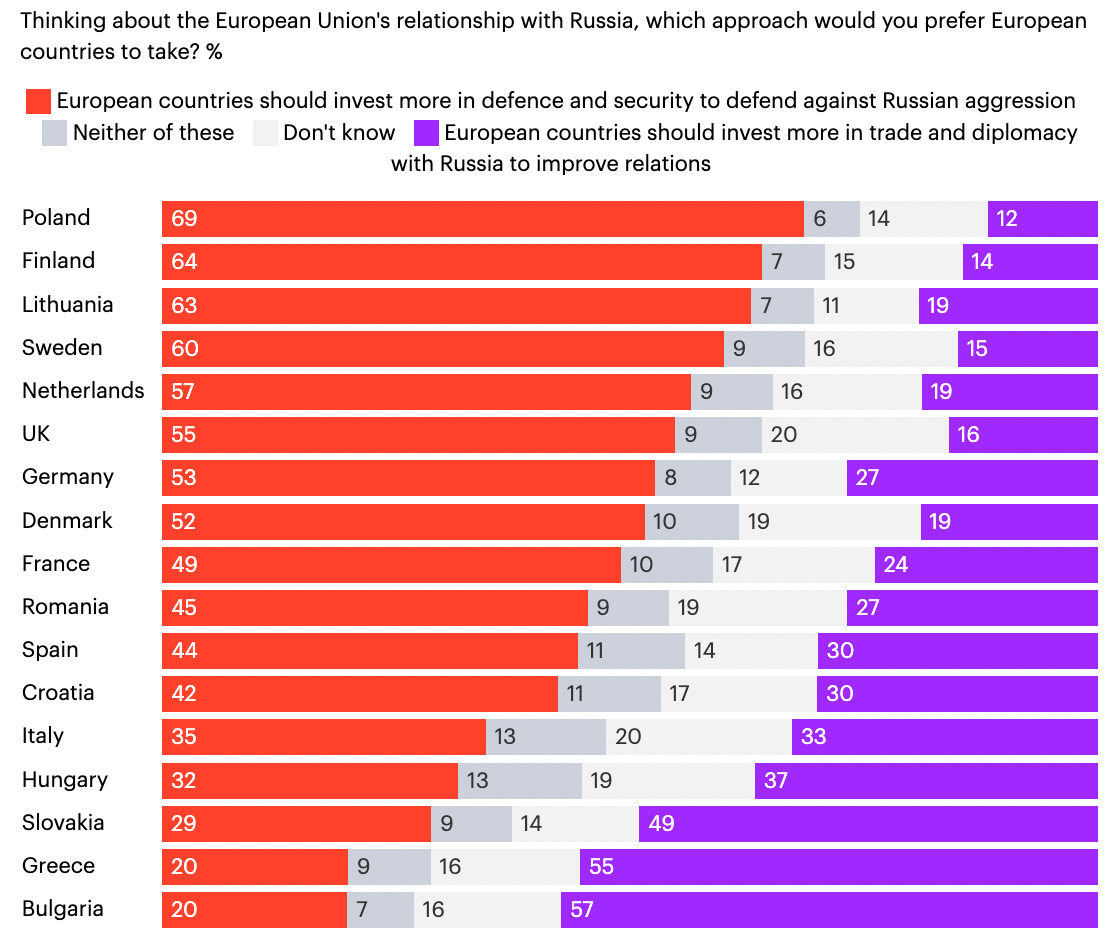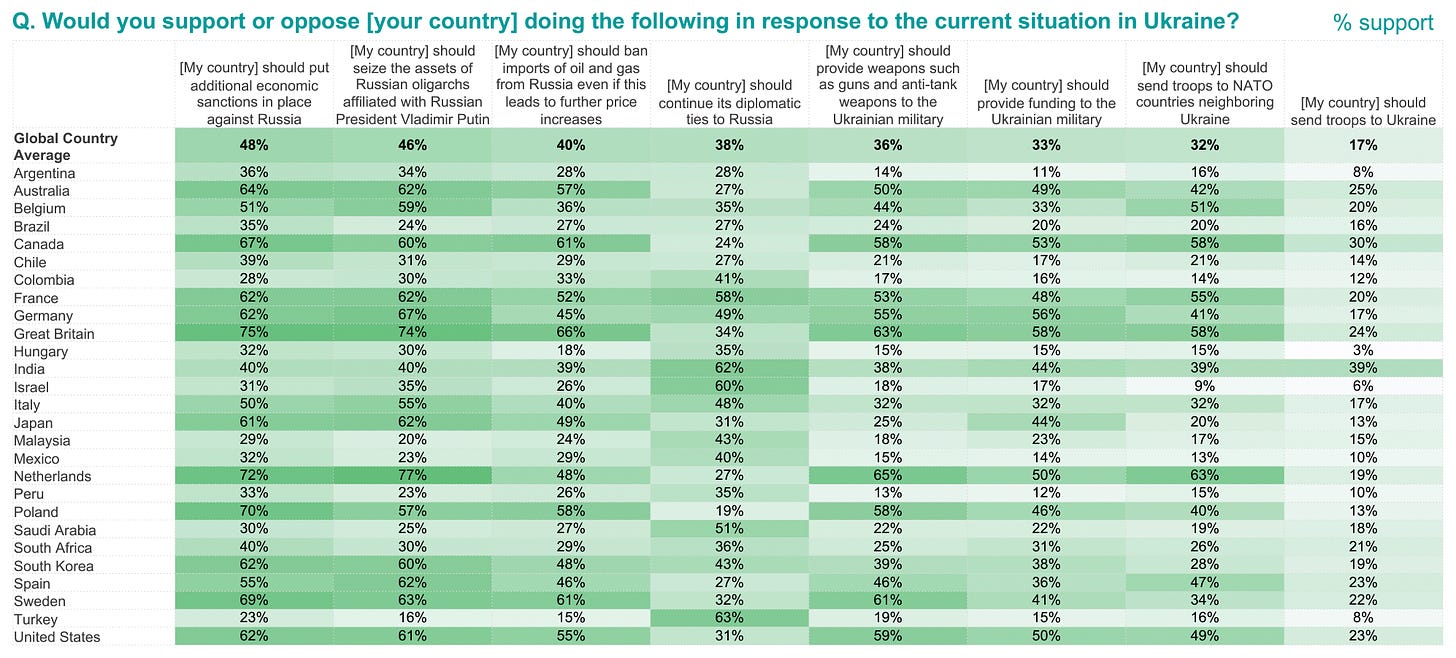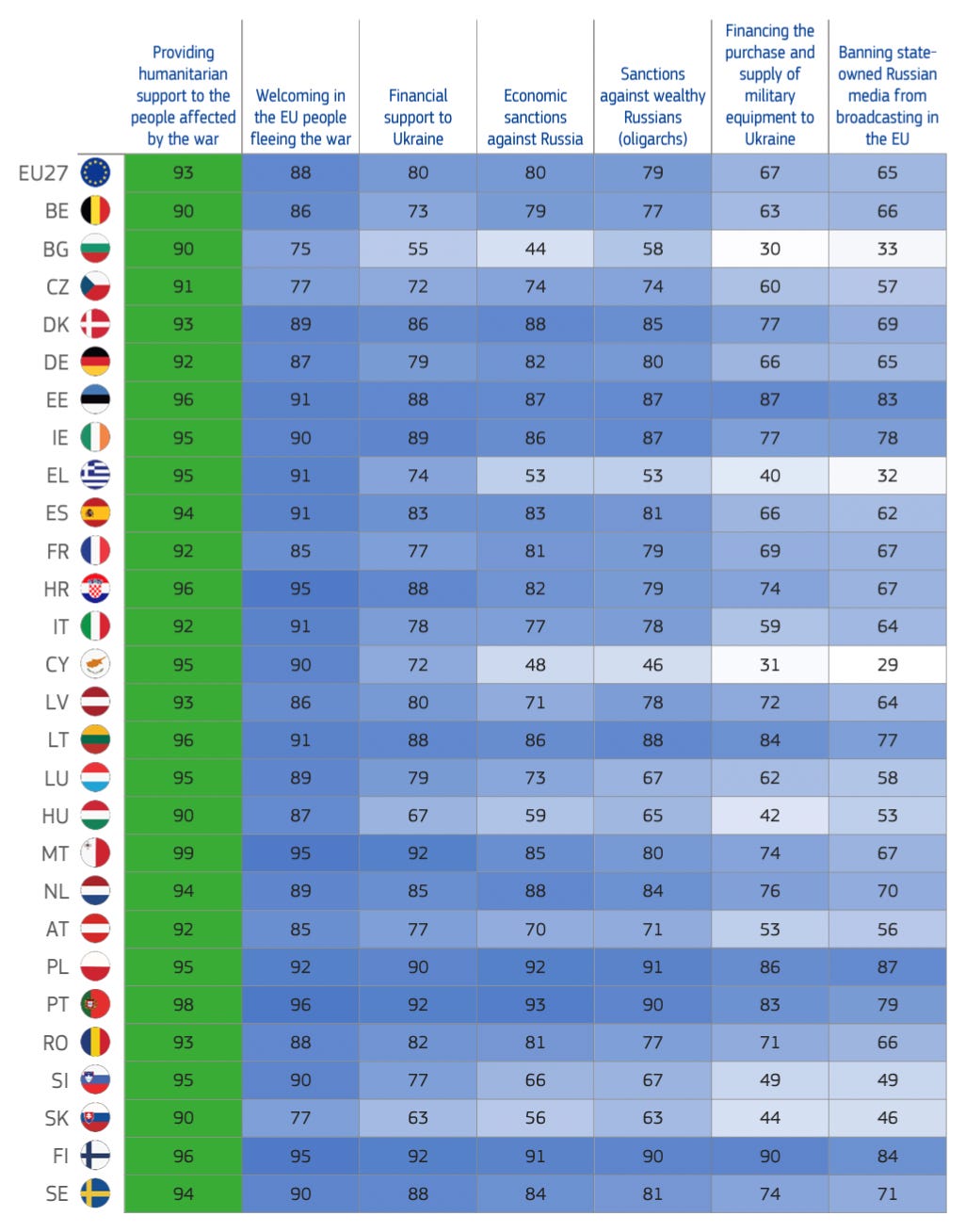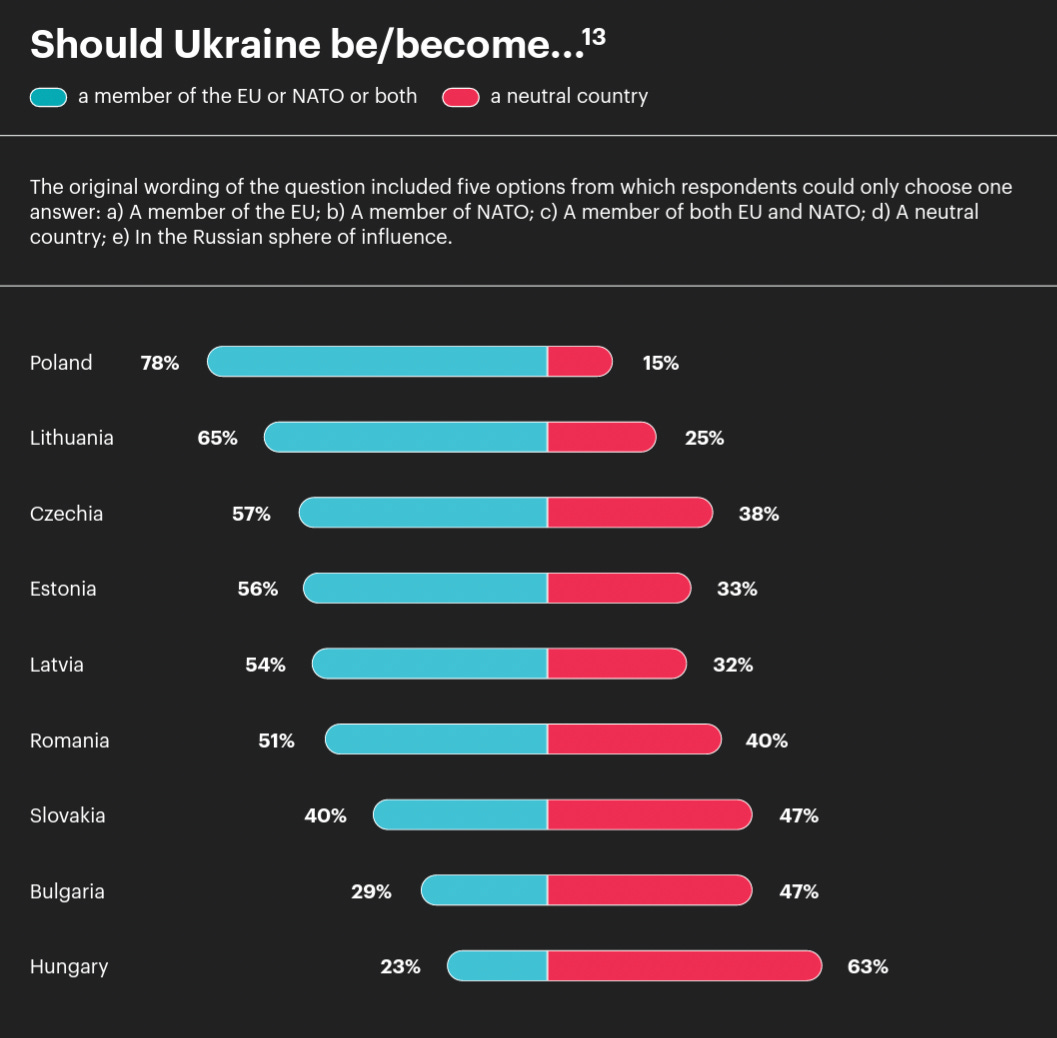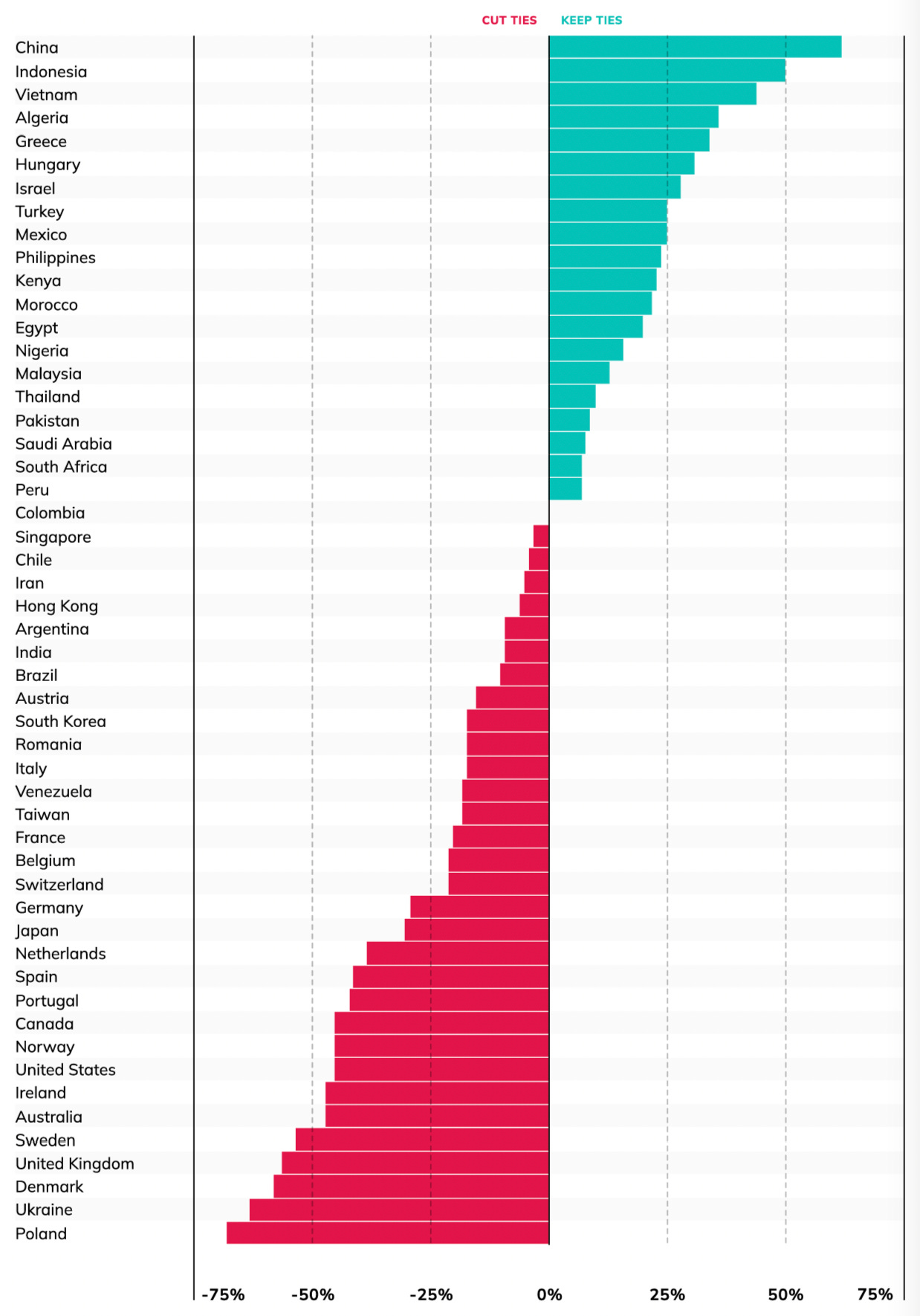Public opinion on the war in Ukraine
NOTE: I now write for Aporia Magazine. Please sign up there!
This newsletter is a bit of a data dump, so if you don’t like poring over charts and tables, it may not be for you. My aim was to track down all (or at least most) of the international surveys of public opinion on the war in Ukraine, to see what patterns could be discerned. The article is divided into two main sections: the first deals with the question of who is to blame for the war, and the second with the question of what should be done about it.
Who is to blame?
YouGov surveyed people in 17 European countries. Respondents were asked, “From what you’ve read and heard, who do you think is responsible for the current situation in Ukraine?” A majority in 12 countries, and a plurality in three, said “Entirely Russia/more Russia than NATO”. In the remaining two, a plurality said “Entirely NATO/more NATO than Russia”. Finns, Swedes and Brits were the most likely to blame Russia, while Slovaks, Greeks and Bulgarians are the most likely to blame NATO.
On behalf of the European Council on Foreign Relations, YouGov surveyed people in ten European countries. Respondents were asked, “Who is mainly responsible for the outbreak of the war in Ukraine?” A majority in every country said “Russia”. Finns, Brits and Poles were the most likely to blame Russia, while Italians, Romanians and French were the least likely to do so.
The Eurobarometer surveyed people in all 27 EU countries. Respondents were asked how much they agreed or disagreed with the statement, “Russian authorities are responsible first and foremost for the current situation.” A majority in 25 countries agreed. In Bulgaria there was no majority, and in Cyprus a plurality disagreed. Finns, Poles and Dutch were the most likely to agree, while Greeks, Bulgarians and Cypriots were the most likely to disagree.
GLOBSEC Trends 2022 surveyed people in nine Eastern European countries. Respondents were asked whether Russia, the West or Ukraine bears most responsibility for the war. A majority in seven countries, and a plurality in the remaining two, said “Russia that invaded Ukraine”. Poles, Czechs and Lithuanians were the most likely to blame Russia, while Slovaks, Bulgarians and Hungarians were the least likely.
Valicon surveyed people in four Balkan countries. Respondents were asked who bears most responsibility for the war. A majority of Croats, Solevenes and Bosnians said “Russia”. A majority of Serbs said “US”. Serbs were by far the least likely to blame Russia.
Brand Finance surveyed people in ten countries. Respondents were asked, “Who is to blame for the conflict in Ukraine?” A majority in six countries, and a plurality in three, said “Russia”. A plurality in China said “United States”. Japanese, Brits and Germans were the most likely to blame Russia, while Turks, Indians and Chinese were the least likely to do so.
On behalf of Arab News, YouGov surveyed people in 14 Arab countries. Respondents were asked, “Who do you think is responsible for the conflict?” A plurality of respondents said “Don’t know/Not sure”, but of those who answered, a majority said “US President Joe Biden” or “NATO”. A breakdown by country is not given, but this pattern of results was found in all three regions: the Gulf Cooperation Council, the Levant, and North Africa. It is consistent with a Turkish poll in which a plurality blamed “US-NATO”.
What should be done?
On behalf of the European Council on Foreign Relations, YouGov surveyed people in seven European countries. Unlike the others, this survey was carried out before Russia’s invasion began. Respondents were asked, “Is the threat of an economic downturn worth the risk of defending Ukraine in the event of a Russian invasion?” A majority of Poles, and a plurality of Swedes and Romanians, said “Risk worth taking”. A plurality of Finns, Italians, Germans and French said “Risk not worth taking”.
YouGov surveyed people in 17 European countries. Respondents were asked, “Thinking about the European Union’s relationship with Russia, which approach would you prefer European countries to take?” A majority in eight countries, and a plurality in five, said “European countries should invest more in defence and security”. A majority in Bulgaria and Greece, and a plurality in Slovakia and Hungary, said “European countries should invest more in trade and diplomacy with Russia”.
On behalf of the European Council on Foreign Relations, YouGov surveyed people in ten European countries. Respondents were asked “whether Europe should seek to end the war as soon as possible – even if it means Ukraine making concessions” or “whether the most important goal is to punish Russia for its aggression – even if such a road leads to protracted conflict and more human suffering”. Those who selected the first option were placed in the “Peace camp”, while those who selected the second were placed in the “Justice camp”. A majority of Italians, and a plurality of Germans, Romanians, French, Swedes, Spaniards, Portuguese and Finns were in the “peace camp”. A plurality of Brits were “Swing voters”, and a plurality of Poles were in the “Justice camp”.
Ipsos MORI surveyed people in 27 countries. Respondents were asked whether they would support or oppose their country doing various things in response to the situation in Ukraine. On the chart, darker shades indicate higher levels of support for the relevant measure. Looking across the columns, support is much lower in the non-Western countries than in the Western countries, with the exception of the central column where the wording is reversed. Hungary and Israel resemble the non-Western countries.
The Eurobarometer surveyed people in all 27 EU countries. Respondents were asked whether they approved of various measures announced by the EU in response to the war in Ukraine. Again, dark shades indicate higher levels of approval. Looking across the columns, approval is above 50 percent in most countries, with the exception of Bulgaria, Greece, Cyprus, Hungary, Slovenia and Slovakia. Approval is particularly high in Estonia, Poland and Finland.
GLOBSEC Trends 2022 surveyed people in nine Eastern European countries. Respondents were asked whether Ukraine should be a member of the EU or NATO, a neutral country or in the Russian sphere of influence. A majority in six countries said “a member of the EU or NATO”. A majority in Hungary, and a plurality in Slovakia and Bulgaria, said “a neutral country”. Poles, Czechs and Lithuanians were the most supportive of Ukraine joining the EU or NATO, while Slovaks, Bulgarians and Hungarians were the least supportive.
The Democracy Perception Index 2020 surveyed people in 53 countries. Respondents were asked whether their country should cut economic ties with Russia over its invasion of Ukraine. In 31 countries, there was net support for cutting ties. In 21 countries, there was net support for keeping ties. Poles, Danes and Brits were the most supportive of cutting ties (along with Ukrainians), while Vietnamese, Indonesians and Chinese were the most supportive of keeping ties.
On behalf of Arab News, YouGov surveyed people in 14 Arab countries. Respondents were asked, “What do you think the Arab world should do with regards to the conflict?” A majority said “Try to resolve it diplomatically”, and an additional 38% said “Nothing – stay neutral”. This pattern of results was found in all three regions: the Gulf Cooperation Council, the Levant, and North Africa.
Conclusions
Several patterns are evident in the data. Unsurprisingly, there is more support for sanctions and other measures in countries where more people blame Russia for the conflict. In general, non-Western countries are less likely to blame Russia and much less likely to favour sanctions. Yet there is some overlap, with certain Western countries being less hawkish on Russia than many non-Western countries.
China is clearly the least hawkish on Russia, and in fact, other polling indicates that most Chinese actively support Russia. Within Europe, there is also a clear pattern: Finns, Poles, Estonians, Swedes and Brits are the most hawkish on Russia; while Serbs, Slovaks, Hungarians, Bulgarians, Greeks and Cypriots are the least hawkish. Germans, French and Italians find themselves somewhere in the middle. Public opinion appears to correlate strongly with the decisions of national governments.
What explains the global pattern of public opinion? The reasons for Chinese opinion are obvious: most Chinese (correctly) see the US as the country’s main geopolitical adversary, and of course the “enemy of my enemy is my friend”. However, there’s also the shared history of communism, which may explain why Vietnam is the second most “pro-Russian” country.
As to the pattern within Europe, it’s not a simple division between Western countries and those that belonged to the Eastern Bloc. You might expect the countries that were pushed around by Russia during the Cold War would be more “anti-Russian” today, but that appears not to be the case – at least on average. For example, three of the six most “pro-Russian” countries were in the Eastern Bloc, and two of these – Slovakia and Hungary – were actually invaded.
Nor does the pattern correlate strongly with energy dependence on Russia prior to the invasion. You might expect the countries that were more dependent on Russian energy would be less “anti-Russian”, but that appears not to be the case. For example, two of the five most “anti-Russian” countries – Finland and Estonia – were heavily dependent on Russian gas. On the other hand, four out of the six most “pro-Russian” countries are quite dependent on Russian energy.
Orthodox Christianity (the main religion in Russia) appears to be a relevant factor: four out of the six most “pro-Russian countries” – Serbia, Greece, Bulgaria and Cyprus all have a high percentage of Orthodox Christians. On the other hand, Georgia has a high percentage too, and that country is not generally considered an ally of Russia – quite the opposite, in fact. Ditto Ukraine. Slovakia and Hungary do not have many Orthodox Christians, but are heavily dependent on Russian energy.
Another potentially relevant factor is having a border with Russia or Belarus. This is the case for three out of the five most “anti-Russian” countries – Finland, Estonia and Poland. Incidentally, one reason why “anti-Russian” sentiment isn’t higher in Lithuania and Latvia is that both of those countries have sizeable ethnic Russian minorities, whose responses may have pulled down the averages.
British opinion is most likely due to the fact that standing up to Hitler in World War II is part of our national identity, and many people see Putin’s invasion of Ukraine as analogous to Hitler’s invasion of Poland. (This is despite the fact that Stalin also invaded Poland during World War II, as well as Finland, and Britain formed an alliance with the Soviet Union.) Do let me know if you have another hypothesis.
Image: Mstyslav Chernov, Remains of an Eastern Orthodox church, 2015
Thanks for reading. If you found this newsletter useful, please share it with your friends. And please consider subscribing if you haven’t done so already.

